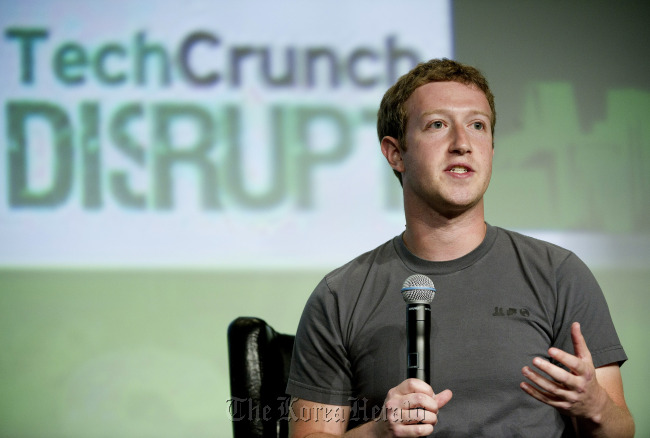SAN FRANCISCO (AFP) ― Facebook founder Mark Zuckerberg said Tuesday he was steering the social network giant to focus more on mobile, saying it would help ease concerns after a “disappointing” stock market debut.
“The performance of the stock has obviously been disappointing,” Zuckerberg said during an on-stage interview at a TechCrunch Disrupt conference in San Francisco.
Facebook has made a priority of following its more than 900 million members onto smartphones and tablet computers, tailoring services and money-making ads for mobile devices.
“It is really clear from the stats and my own personal intuition that a lot of energy in the ecosystem is going to mobile, not desktop (computers),” Zuckerberg said.
 |
Mark Zuckerberg |
“That is the future,” he continued. “We are going to be doing killer stuff there.”
Zuckerberg was adamant that the company was being underestimated and was on track to make “more money on mobile than we make on desktop.”
Zuckerberg’s appearance at the conference was his first public interview since the massive public offering on May 18 that was hotly anticipated ― but ended up being a flop.
Facebook shares have lost around half their value since the IPO at $38 a share.
The shares gained 3.30 percent on Wall Street on Tuesday to close at $19.43. In after-hours trading following Zuckerberg’s remarks, the stock gained 3.14 percent to $20.06.
Zuckerberg said that despite the early stock market disappointment, “we’re going to execute this mission about making the world more connected.”
Zuckerberg also rejected criticism that the company is ill-prepared for a shift to mobile devices, where Facebook has only begun to get ad revenues.
“Now, we are a mobile company,” he said.
He said the company would pursue its “mission” while seeking to make money for shareholders.
“We are a mission driven company,” Zuckerberg said.
“Building a mission and building a business go hand in hand. From the beginning we’ve had this understanding we’ve had to do both.”
Zuckerberg has stated repeatedly, even in pre-IPO paperwork with U.S. regulators, that Facebook did not build great services to make money but made money to build great services.
When pressed on the point, in the context of the California-based company losing more than $50 billion in value based on the stock price drop, Zuckerberg was quick to add that making money was a component of its broader mission.
“People who want to work on a great mission also want to make a bunch of money,” he contended.
Zuckerberg conceded that the stock price plummet has taken a toll on the morale of workers compensated with shares but that Facebook staff are accustomed to criticism and “have a pretty good compass” pointing to better days.
Stock compensation for Facebook employees is made based on cash value of shares, meaning that workers are awarded more shares at lower prices, according to the chief executive.
“I actually think it is a great time for people to join and a great time for people to stay and double-down,” Zuckerberg said of the Facebook team. “I think we are seeing that.”
Zuckerberg rejected suggestions that Facebook would make its own smartphone, adamant that the company had no intention of stepping into the fiercely competitive handset hardware arena.
“Apple, Google, everyone builds phones; we are going in the opposite direction,” Zuckerberg said.
“We want to build a system deeply integrated in every device people want to use.”
Zuckerberg’s strategy to have Facebook on every smartphone instead of making a “Facebook phone” makes sense, according to technology analyst Jeff Kagan.
Zuckerberg said Facebook did not plan to go head-to-head with Google in the online search market but that the social network already handles one billion queries a day from people looking for friends, apps, brand pages and more.
“Facebook is uniquely positioned to answer a lot of questions people have,” Zuckerberg said, giving examples such as finding out restaurants friends have eaten at or who has connections at particular companies for jobs.
“At some point we will do it,” he continued. “We have a team working on search.”
Kagan said the Zuckerberg talk at the conference rekindled some of Facebook’s pre-IPO excitement but did not make up for the fact that the company’s stock has been a loser and it remained unclear how profitable it would become.
“Bottom line, Zuckerberg sounded good,” Kagan said. “However this does not solve the investment problem the company still faces every day.”








![[Today’s K-pop] Blackpink’s Jennie, Lisa invited to Coachella as solo acts](http://res.heraldm.com/phpwas/restmb_idxmake.php?idx=644&simg=/content/image/2024/11/21/20241121050099_0.jpg)